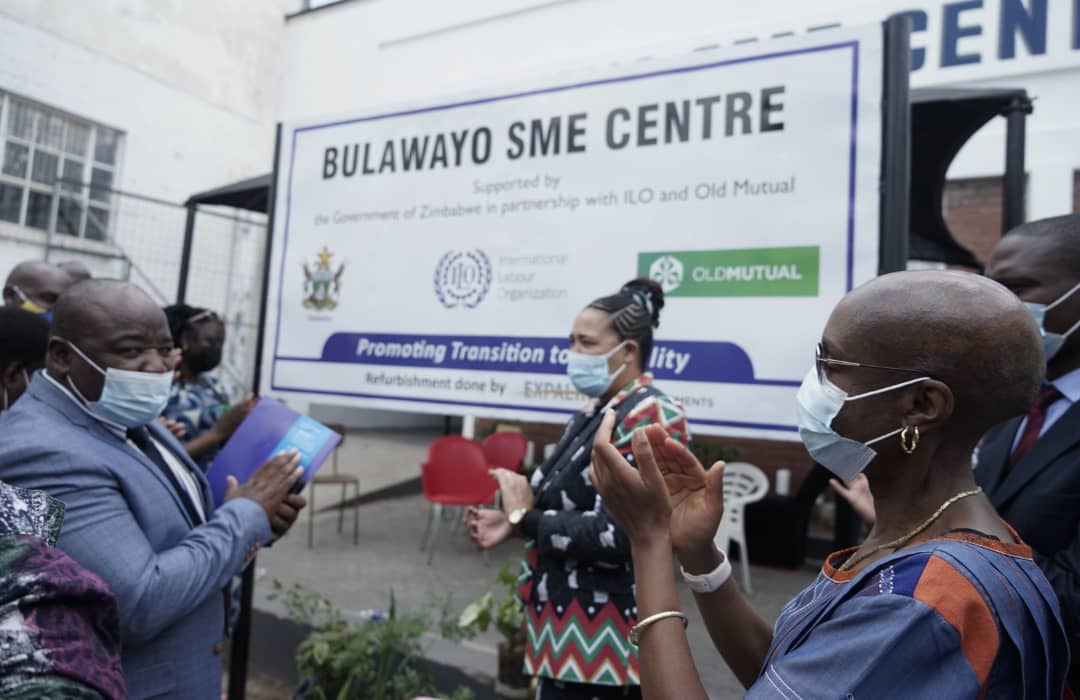|
Getting your Trinity Audio player ready...
|

By Joyce Mukucha Recently in Bulawayo
In an effort aimed at promoting decent work, better working spaces, improving productivity, access to markets and capacity development as well as improving the working conditions of those participating in the informal economy (Small to Medium Enterprises) (SMEs), the International Labour Organisation (ILO) in collaboration with the Employers Confederation of Zimbabwe, Zimbabwe Congress of Trade Unions, Old Mutual and the government among other key partners has officially launched the Bulawayo SME centre worth USD 165 million.
In 2019, the ILO and the Bulawayo City Council entered an agreement as part of the Employment Promotion and Labour Market Programme to develop programmes for economic development, promoting consensus building and democratic involvement among the main informal economy stakeholders and collaborating on the improvement to the workspaces.
Speaking during the official launch of the SME centre in Bulawayo today, the Director for the ILO Office for Zimbabwe, Ms Hopolang Phororo said her organisation was committed to ensure the availability of appropriate workspaces in Zimbabwe to encourage the transition from informality to formality.
She said it was important to promote social justice and decent work in all activities.
“The need to transform the informal economy in Africa into the bedrock of decent work is growing. This also is the case in Zimbabwe and due to Covid-19 about 57% of the working population in Zimbabwe was outside the labour market and the unemployment rate reached 17%. Among those working, 80% were in the informal sector with almost 8 million people food insecure.
“The ILO recognises the potential of the informal sector and its complexities which requires processes that take time.One of those processes involves promoting higher productivity and better working conditions in the MSMEs in the informal economy.
“Going forward, the central ambition of the 2030 Sustainable Development Agenda to leave no one behind certainly resonates with the billions of informal economy workers around the world, including in Zimbabwe. The National Development Strategy (NDS) 1, 2021-2025 talks to revamping job creation and this will be realized through micro, small and medium enterprises (MSMEs). Addressing the decent work deficits in the sector enables informal economy workers to have a chance to escape situations of working poverty. The United Nations Sustainable Development Cooperation Framework, 2022-2026, which was recently launched in Zimbabwe identifies outcomes towards the realization of this goal,” she said.
ILO, she said would like to witness the promotion of better working conditions and higher productivity in the informal sector highlighting that better workspaces have the potential to improve productivity, access to markets, access to funding, access to technology and access to capacity development.
Ms Phororo highlighted that partnerships which contributed to the success of coming up with the renovated market which seeks to see transition from informality to formality were crucial in the development agenda.
“Today is not about what ILO has done or is planning to do. This is a day for celebrating partnerships because even an organization, as big as the ILO cannot facilitate the formalization of the informal economy alone. Partnerships have a crucial role to play in the development agenda. To reach the critical mass required to facilitate transition from the vast informal economy to the formal, there must be more concerted effort, greater collaboration, alignment of inputs, and a leveraging of resources and effort. Most importantly, there is a need to build upon, strengthen and enhance the capabilities of those who labour in the informal economy in articulating their needs in an open process of co-creation led by the constituencies themselves.”
SMEs in Zimbabwe complement the efforts of large corporations in the production of goods and services. They fill in the gap that is not covered by large firms and they account for nice than 90 percent of the economy.
Meanwhile, the Deputy Minister of Women Affairs, Community, Small and Medium Enterprise Development, Jenifer Mhlanga who

was the guest of honour expressed her gratitude to ILO for working tirelessly improving the workspace which benefitted more than 60 enterprises and their 100 employees.
She said government will continue supporting processes like these which are aimed at improving lives and livelihoods of various Zimbabweans.
“It is important to address challenges faced by SMEs. The continuous expansion of the informal confronting our nation needs to be addressed. The majority of these workers are at the very bottom of the economic and social ladder and work under unhygienic conditions. This has deprived che sector much needed markets to sell their products hence can’t sustain their businesses.
“I want to thank ILO for improving the quality of work by the informal sector, enhancing productivity while deepening the respect for workers’ fundamental rights and ensuring opportunities for income security, livelihoods and entrepreneurship. This is critical when it comes to encouraging transition from informality to formality. Working conditions are key dimensions of decent and productive work.
“The task that has been completed will create an enabling environment, improve incomes as well as promoting the rights of workers in decent working conditions that will upheld for dignity in working places as which is well in line with the country’s vision of achieving an upper middle income status by 2030,” said Deputy Minister Mhlanga.
She added that this avails an opportunity for the government and all stakeholders to reflect and acknowledge that with such interventions, there can be immense contribution in the transitioning of those operating informally to formality.
According to ILO, SMEs generally struggle to access affordable and appropriate workspace. In as much as Bulawayo is a former industrial hub, the factory spaces are too large and costly, making them inaccessible to SMEs-thw majority of which comprise survivalist business. As a result, SMEs rely on home industries which have limited space and facilities to enable growth of their businesses.
In an interview, one the entreprenuers operating at the newly launched SME Bulawayo centre, Quiteness Mpofu said she was excited and grateful to be working in the renovated environment.
“I’m happy to be operating here at OK Mart, the SME centre because the place is bigger and the environment is conducive. I work here as a tailor sewing different things. Though the business is low because of Covid-19 but after the renovations, the place is now attractive and customers like it and we are hoping that they will come to this nice place in their numbers and support our business. This commissioned place will allow our businesses to grow,” said Mpofu.
Another SME Jelitha Ndlovu said the place was safe, more attractive and allows for more sustainable production.
“I love to be working here as an entrepreneur. The renovated place safe and the environment is good. As SMEs, we are hoping that operating at the site like this one, our productivity will be improved. We also believe that improved access to workspace contribute to formalization and business growth.”
Representing Mayor of Bulawayo, Councilor Solomon Mguni, Cllr Ruzive said it was of paramount importance to facilitate the transition from the informal economy to the formal economy through a renovation of a workspace in the City of Bulawayo that houses informal businesses in a safe and secure manner.
Minister for Provincial Affairs and Devolution, Bulawayo Metropolitan Province, Honourable Judith Ncube said she was proud to be hosting the gathering where the masterpiece of the refurbished Bulawayo SMEs Centre was being commissioned.
“The process took time to finally get to where we are today. This has attached an element of value and pride for this Centre in respect of the entrepreneurs themselves.Most importantly is the endurance that the stakeholders and the entrepreneurs have gone through to achieve this state of the art establishment. I want to thank the entrepreneurs who, at some point, had to move out to operate elsewhere but had the patience to wait until the exercise was completed. Of importance again is the involvement of various technocrats whose product is in tandem with the requirements of contemporary architectural and technological standards,” she said.
ILO’s partnership with the City of Bulawayo has been widely recognized as a viable, comprehensive, and practical model to strengthen the capacity of local authorities to design and deliver services that create an enabling environment to promote the transition from the informal economy to the formal one.






